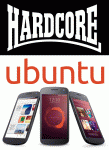
The odds are stacked against Canonical’s late-comer Ubuntu phone OS. But by seducing hardcore mobile users who love to customize, it could could box out Microsoft and pull lucrative customers away from Android and iOS. Tinkerers buy high-end devices, pay for apps, and attract premium advertisers. So if Ubuntu mobile gains traction, it could earn solid revenue and win the mobile bronze medal.
You could divide Android’s customer base into two categories if you wanted to make things simple. There’s budget-minded first-world citizens plus those in emerging markets that buy low-end Androids because they’re affordable. And the there’s the hackers, mod’ers, customizers, and other seriously wired people who value Android’s flexibility. They don’t want a dumbed down iOS device. They want an an OS they can truly personalize.
It’s this second group Ubuntu mobile will appeal to. It’s also gunning for uniqueness-craving users that might be into Microsoft’s Metro mobile OS, and design geek iOSers who’ll dig Ubuntu’s refined style. And then there’s the savvy teens who want something different than their parents’ boring operating system. They all could flirt with Ubuntu if Canonical sells it right. Already, the company seems to see this niche as its destiny.
Canonical‘s CEO Mark Shuttleworth said in the industry proposition video, “When you turn on the Ubuntu phone you’ll see something strikingly different. You’ll see a beautiful reflection of yourself, a visualization of your life crafted by an artist, ever-changing, totally personal, and completely unique, just like you.”
Shuttleworth explains “you’re in control of the controls” thanks to a customizable set of favorite apps revealed with a swipe. Pull down to the bottom to hide buttons and let apps shine full-screen. From the lock screen you can access any app and see evolving graphics representing your latest alerts. You can hook it up to a monitor or other peripherals, which could be nice for developers. It’s open source. These all could attract people serious about customizing their phones.
Of course, without manufacturers or carriers locked down, the future where Ubuntu makes a dent in its competitors is hazy at best. At the current rate of development, Android will be a technological powerhouse by 2014 when Canonical expects Ubuntu phones to hit the market. Metro may have gained a foothold, and iOS will be institutionalized.
But Ubuntu doesn’t need to displace iOS or Android, or even try to. It could use a know-your-role strategy of not shooting for #1, similar to Opera. If Ubuntu resonates with hardcore users, it could gain just enough traction to win third-place. That would sucker-punch Microsoft, and put another nail in RIM’s coffin. Mobile’s big enough to support a few winners. Android and iOS have a big lead and are jostling for the top two spots.The race for #3 just got a lot more interesting.



